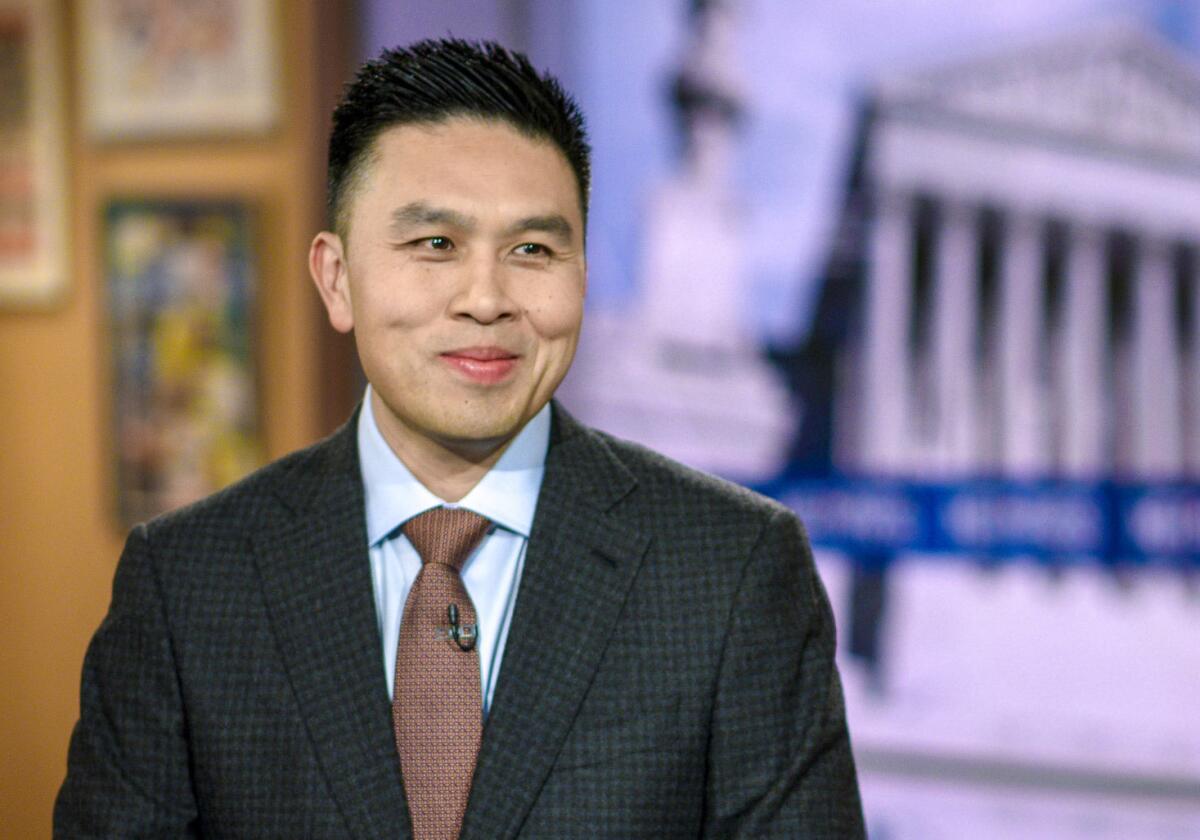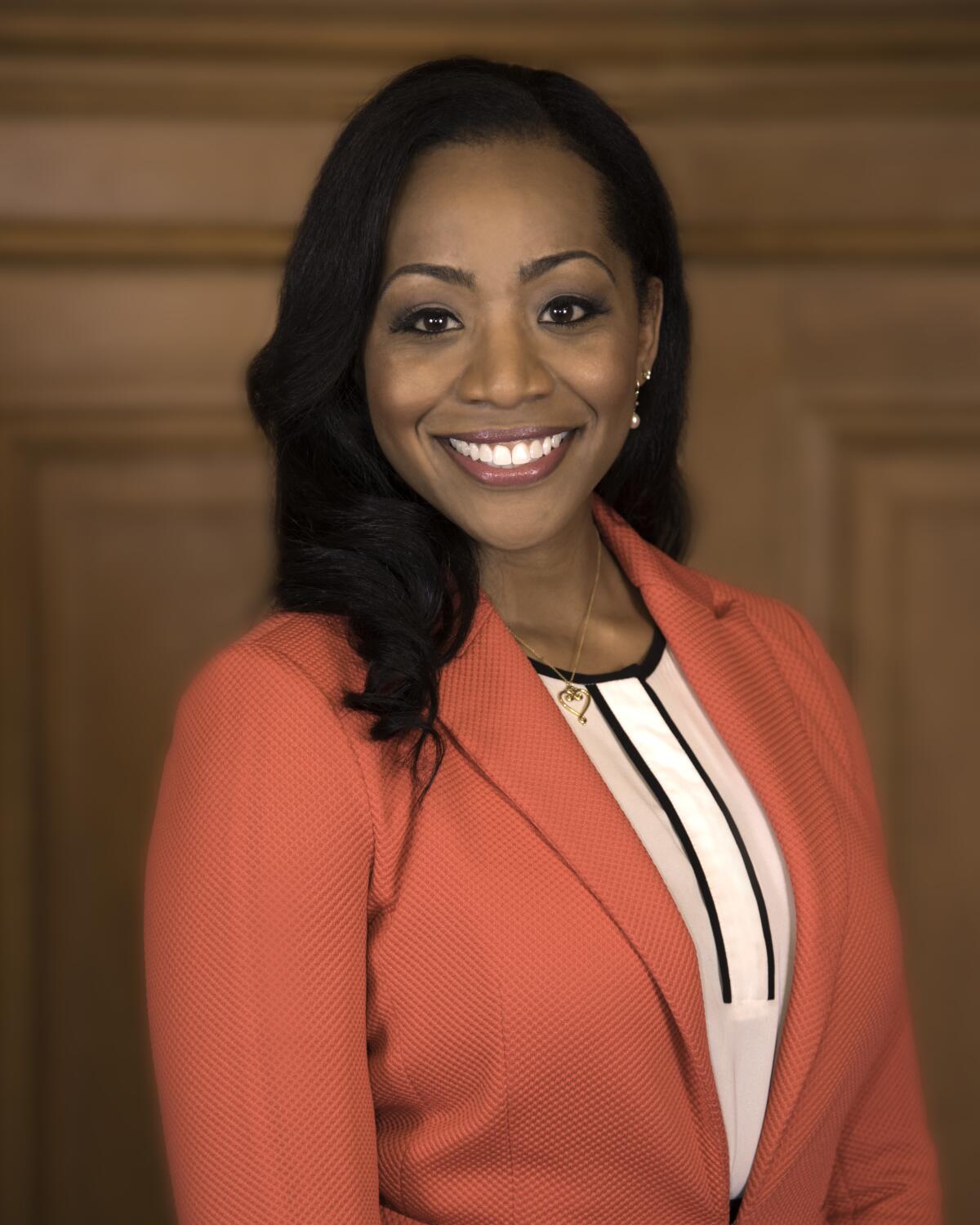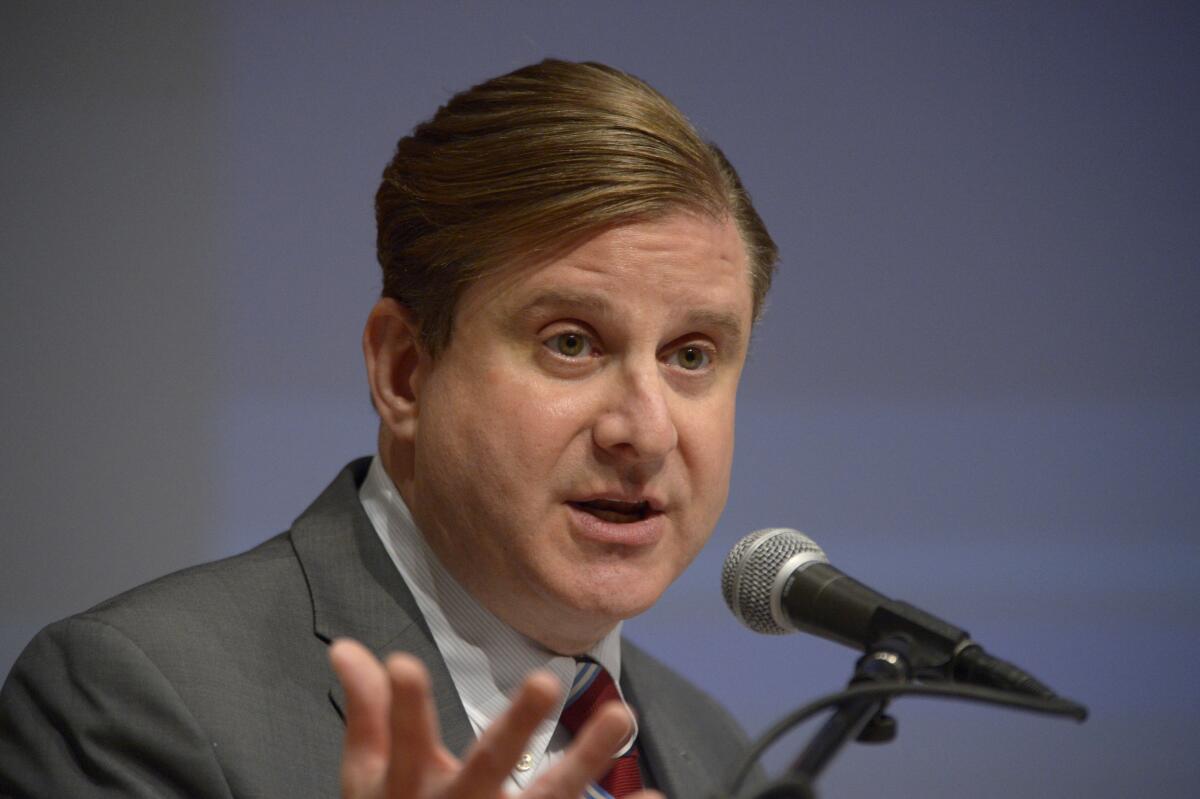Column: A Republican has a shot at becoming California state controller. Yes, you read that right

- Share via
SACRAMENTO — You won’t read this very often: A Republican is favored to win a California statewide election.
Lanhee Chen is likely to finish first in the June 7 primary and advance to the November runoff for state controller. But then the odds are he’ll turn into a pumpkin and lose to a Democrat.
For the record:
5:23 p.m. May 23, 2022An earlier version of this story said California state controller candidate Yvonne Yiu served on the Monterey City Council. She serves on the Monterey Park City Council.
That said, he has the best chance of any Republican in many years to capture a statewide office in Democrat-dominant California.
He’s an appealing candidate, particularly for a Republican in a deep blue state where the GOP is struggling to survive and has been fielding second-raters for statewide office.
But the reason he’s favored to be the primary’s No. 1 vote-getter is simple math.
Chen is the only Republican running for the office, which issues state checks and is supposed to be a fiscal watchdog. The California GOP has only about half the registered voters that Democrats have, but virtually all who cast ballots will support Chen.
Chen’s percentage of the total vote should be at least in the mid-30s, probably enough to finish on top.
The top two vote-getters will advance to the runoff, regardless of party.
So, the most important fight is among four Democrats scrapping for the rest of the votes, trying to be the runner-up.
They’re state Board of Equalization member Malia Cohen, Los Angeles City Controller Ron Galperin, state Sen. Steve Glazer of Orinda and Monterey Park City Council member Yvonne Yiu.
Lanhee Chen, a Stanford professor and GOP advisor, hopes to break the party’s losing streak in California.
One probably will become the next controller, replacing the termed-out Betty Yee.
Chen, 43, the son of Taiwanese immigrants, grew up in the San Gabriel Valley and earned degrees at Harvard. He got into politics as a policy guru in Republican Mitt Romney’s two presidential campaigns. President Obama named him to the bipartisan Social Security Advisory Board. He currently teaches public policy at Stanford and advises business clients.
Chen’s pitch to voters is that he’s not a Sacramento insider. He’d bring a fresh lens to the office unobstructed by Capitol political ties.
“An outsider can come in and hold people to more accountability,” he says. “I’ve been consistently surprised at the lack of more rigorous auditing” of state spending.
A Republican controller would “bring some checks and balances back to state government” now controlled by one party, he asserts.
But what kind of Republican is Chen? Did he vote for Donald Trump? He won’t say.

Chen clearly thinks he can’t win by answering. If he voted for the former president, he’d discredit himself with Democrats. If he didn’t, many Republicans would abandon him. And he needs bipartisan support.
Chen does say that President Biden beat Trump legitimately without fraud. And he believes Trump “played a role” in the Jan. 6 Capitol invasion, which was “an abomination.”
“He was involved getting people fired up that day and bears some responsibility,” Chen says. “Those involved in fomenting should be prosecuted.”
He quickly adds: “I’m not saying [Trump] is criminally responsible. That’s up to a prosecutor.”
The Democratic establishment candidate is Cohen, 44, a former member of the San Francisco Board of Supervisors and the most outspoken liberal of the group.
She’s endorsed by the California Democratic Party and a long list of VIPs, including House Speaker Nancy Pelosi and Sen. Dianne Feinstein.
Cohen says she’s passionate about making California equitable with diverse leadership.
“We need to have more conversations about equity, what that looks like in the distribution of tax dollars,” she told Cal Matters, a news service.
Galperin and Glazer — like Chen — focus on the need to expose wasted tax dollars. They promise to aggressively audit state spending to avoid scandals such as the one that soiled the state Employment Development Department. Billions in unemployment benefits were sent to prisoners and other scammers during the pandemic.
The candidates also assert that billions have been spent on homelessness with little to show for it.
“The problem just hasn’t gotten any better,” Glazer says.
“It’s not for lack of money,” Galperin says. “It’s lack of a strategy and leadership to address the problem correctly.”

Galperin recently released an audit showing that a $1.2-billion homeless housing bond program approved by L.A. city voters six years ago has produced only 1,142 units averaging nearly $600,000 each.
Galperin, 58 — the first openly gay elected city official in L.A. — is the only candidate who has actually been a controller. He calls it a “golden ballot designation.”
Another political benefit is the hot mayoral election that will help turn out his L.A. voter base, he believes.
Galperin says he’d make state government more transparent by posting “every single expenditure” online in an understandable format.

Glazer, 64, a former mayor of Orinda, understands the ins and outs of state government better than any other candidate. He’s a two-term senator and former Gov. Jerry Brown’s chief political advisor. But that doesn’t mean he’s a stereotypical insider.
Glazer is a pragmatic, independent-minded centrist who has often ruffled party feathers. Labor has opposed him for trying to ban strikes on commuter-heavy Bay Area Rapid Transit lines. He was the only Senate Democrat to vote against the hefty gas tax increase in 2017 and an irresponsible “single-payer” universal healthcare bill that didn’t contain a financing mechanism.
“I promote progressive policies with fiscal responsibility,” he says. “Every dollar matters. That’s the short summary of who I am.”
Yiu, 50, a financial manager born in Hong Kong, is the mystery candidate.

For one, it’s not clear how she’d handle the job because she hasn’t offered details.
And two, she has poured a heap of her own money into the campaign — $5.7 million. No one’s sure what impact that will have on voting.
The best bet is that a Republican will win the most primary votes and the runner-up will ultimately win the office.
More to Read
Sign up for Essential California
The most important California stories and recommendations in your inbox every morning.
You may occasionally receive promotional content from the Los Angeles Times.












